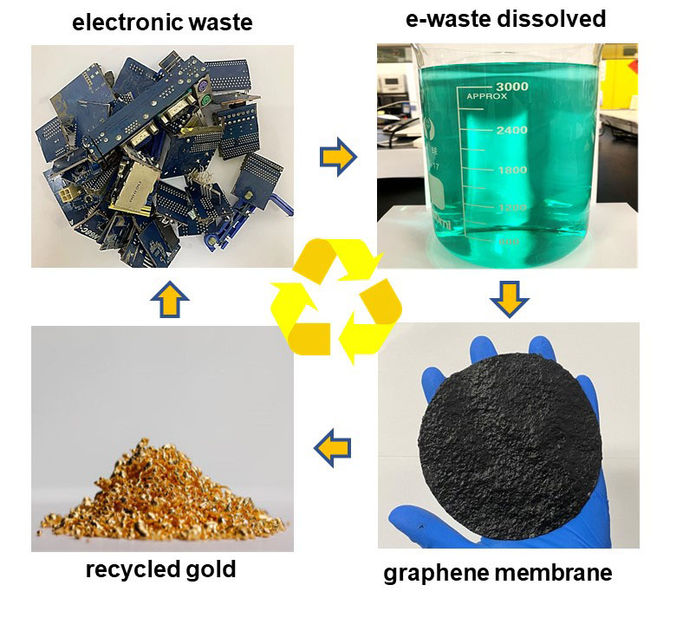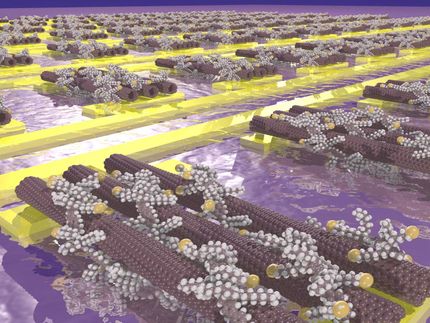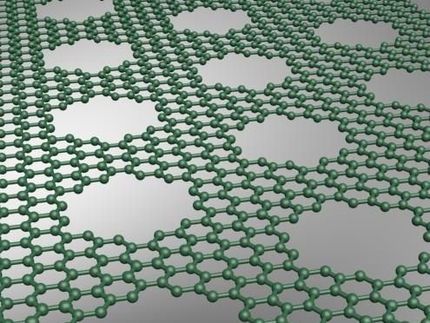Graphene as 'the philosopher’s stone’: turning waste into gold
"This apparent magic is essentially a simple electrochemical process"
Throughout history, alchemists believed in the existence of the philosopher’s stone: a substance that could turn cheap substances into precious gold. Now scientists from The University of Manchester, Tsinghua University in China and the Chinese Academy of Sciences have shown that graphene can be a kind of philosopher’s stone, allowing gold extraction from waste containing only trace amounts of gold (down to billionth of a percent).

Gold extraction recycling using graphene
The University of Manchester
This new, seemingly magical application of graphene works quite straightforwardly: add graphene into a solution containing traces of gold and, after a few minutes, pure gold appears on graphene sheets, with no other chemicals or energy input involved. After this you can extract your pure gold by simply burning the graphene off.
The research, published in Nature Communications, shows that 1 gram of graphene can be sufficient for extracting nearly 2 grams of gold. As graphene costs less than $0.1 per gram, this can be very profitable, with gold priced at around $70 per gram.
Dr Yang Su from Tsinghua University, who led the research efforts, commented: “This apparent magic is essentially a simple electrochemical process. Unique interactions between graphene and gold ions drive the process and also yield exceptional selectivity. Only gold is extracted with no other ions or salts.”
Gold is used in many industries including consumer electronics (mobile phones, laptops etc.) and, when the products are eventually discarded, little of the electronic waste is recycled. The graphene-based process with its high extraction capacity and high selectivity can reclaim close to 100% of gold from electronic waste. This offers an enticing solution for addressing the gold sustainability problem and e-waste challenges.
“Graphene turns rubbish into gold, literally,” added Professor Andre Geim from The University of Manchester, another lead author and Nobel laureate responsible for the first isolation of graphene.
“Not only are our findings promising for making this part of the economy more sustainable, but they also emphasise how different atomically-thin materials can be from their parents, well-known bulk materials,” he added. “Graphite, for example, is worthless for extracting gold, while graphene almost makes the philosopher’s stone”.
Professor Hui-ming Cheng, one of the main authors from the Chinese Academy of Sciences, commented: “With the continuing search for revolutionary applications of graphene, our discovery that the material can be used to recycle gold from electronic waste brings additional excitement to the research community and developing graphene industries.”
Original publication
Other news from the department science
Most read news
More news from our other portals
See the theme worlds for related content
Topic world Extraction
Extraction is a fundamental process in the chemical laboratory that enables specific components to be isolated and concentrated from a mixture. Whether it's extracting active ingredients from natural products, removing impurities from synthesis products, or preparing analytical samples, extraction is a key step in achieving precise and efficient results in chemical research and analysis.

Topic world Extraction
Extraction is a fundamental process in the chemical laboratory that enables specific components to be isolated and concentrated from a mixture. Whether it's extracting active ingredients from natural products, removing impurities from synthesis products, or preparing analytical samples, extraction is a key step in achieving precise and efficient results in chemical research and analysis.





























































